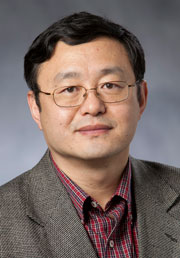
21 February 2012
Jie Liu talks to Heather Montgomery about his scientific inspirations and the next big breakthrough in carbon nanotube research.
Jie Liu is the Jerry G. and Patricia Crawford Hubbard professor of chemistry at Duke University, US. His research interests are carbon nanotubes, nanoelectronics, ZnO nanostructures and microporous carbon
Who inspired you to become a scientist?
My father - he was a high school chemistry teacher and when I was very young, he put the dream of becoming a scientist into my head. He started subscribing to science magazines and when I read these articles, I was amazed with what science can achieve.
How did you get involved in nanoscience?
When I studied chemistry at college in China, I quickly realised that I liked physical chemistry a lot. I became very interested in colloidal science so I chose this topic for my undergraduate research project and my masters degree. When I came to the US, I was very lucky to get the chance to work with Charles Lieber on materials science and surface chemistry. We studied the atomic structure of very tiny domains of 2D crystals. That led me to be very interested in nanoscience.
When I was looking for a postdoctoral position, Richard Smalley came to the university to give a talk. I went there to listen to him talk about carbon nanotubes (CNTs). He was such a good public speaker and the talk was great - very inspiring and interesting. I wrote him a letter saying I was interested in the subject and asked him to take me on as a postdoc. He did! When I went to his lab, I really started enjoying carbon nanotube research. Then, I became a professor at Duke University and decided to continue in the general field of carbon nanotubes. My research interests have expanded to beyond CNTs - I am interested in controlling the materials' structure and properties at the nanoscale. Over the last 10 years, we have worked on CNTs, nanowires, nanoparticle and surface nanolithography using an atomic force microscope (AFM).
What will be the next big breakthrough in your field?
Being able to control the helicity of carbon nanotubes is the next big thing. We are making progress in that direction and theoretical work suggests it might be possible, but practically it is very difficult. We need precise instruments to be able to control the growth environment, but I'm confident that if much better instrumentation, we should be able to control the helicity of carbon nanotubes. Now, we can almost control the electronic properties of CNTs; we can make nanotubes that are over 95% semiconducting - I think that is one of the directions that CNT is heading towards.
I really think nanoscience needs to be more influential and push the field forward at a faster pace in energy research - not just for energy capture and energy storage. Nanoscience is uniquely suited to solve all of these problems. Many people are working in the field, but the progress is not fast. I anticipate bigger breakthroughs in this field in the next couple of years, simply because of the amount of funding, the amount of people and the interest in the field.
Which achievement are you most proud of?
The work we did where we demonstrated that nanotubes can grow to extreme lengths, aligned by the gas flow - that is a milestone in the field. It showed that if there is no external force stopping the growth of CNTs, nanotubes can grow really long and really fast. That was unexpected.
Also, the recent work we did to selectively grow enriched semiconducting CNT arrays. I think with more work in this field, we can definitely make the aligned CNT array a very good candidate for future electronic devices.
Another field that I'm very proud of but I'm not currently working on is the development of the electrochemical dip-pen nanolithography being done by my group. I think that opened the door for dip-pen nanolithography to become a more general, more versatile . It made people think about the chemistry underneath the AFM tip and enabled people to develop more AFM-based nanolithography technology.
What advice would you give to a young scientist?
I'm old now?! I learned from Smalley that if you treat science like your job, it's very hard and time consuming, but if you treat science as a hobby, you will have a different feeling about the work you are and you will enjoy it much more.
Source: Royal Society of Chemistry
No comments:
Post a Comment